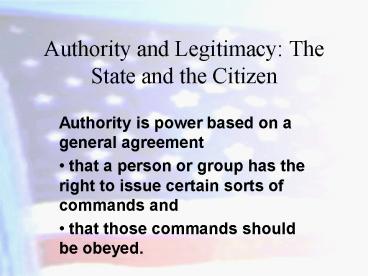Authority and Legitimacy: The State and the Citizen - PowerPoint PPT Presentation
1 / 21
Title:
Authority and Legitimacy: The State and the Citizen
Description:
that a person or group has the right to issue certain sorts of commands and ... Exit polls--polls conducted at polling places on election day. ... – PowerPoint PPT presentation
Number of Views:632
Avg rating:3.0/5.0
Title: Authority and Legitimacy: The State and the Citizen
1
Authority and Legitimacy The State and the
Citizen
- Authority is power based on a general agreement
- that a person or group has the right to issue
certain sorts of commands and - that those commands should be obeyed.
2
Sources of legitimacy
- legitimacy by results
- legitimacy by habit
- legitimacy by historical, religious or ethnic
identity - legitimacy by procedures
3
Constitutionalism
- The doctrine that states should be faithful to
their constitutions.
4
The importance of constitutionalism is rooted in
the protection of citizens from arbitrary
decisions by powerful people
5
Typically, a constitutional document denotes
- How politicians are to be chosen
- The ways the document itself can be changed
- Who is to carry out the major functions of
politics
6
StrictvsFlexible ???
7
The democratic citizen
- Tolerance
- Active Participation
- High level of interest and information
- Support for the state
8
PUBLIC OPINION AND POLITICAL SOCIALIZATION
- How American democracy works depends largely on
who participates and how.
9
POLITICAL SOCIALIZATION
- The process in which individuals acquire the
information, beliefs, attitudes and values that
help them comprehend the workings of a political
system and orient themselves within it.
10
Political Socialization and Other Factors That
Influence Opinion Formation
- Political attitudes are grounded in values. We
learn our values by a process known as political
socialization. - Many factors influence opinion formation.
- The Family
- The Mass Media
- School and Peers
- The Impact of Events
- Social/economic groups
- Religion, Race,
- Education, Income,
- Gender, Region
11
What is Public Opinion?
- Public opinion is 'what the people think about an
issue or set of issues at any given point in
time' and opinions are normally measured by
opinion polls.
12
Opinion Polls
- Polls are interviews or surveys of a sample of
citizens used to estimate how the public feels
about an issue or set of issues.
13
Qualities of Public Opinion
- Intensity - the strength of a position for or
against a public policy or an issue - Fluidity - the extent to which public opinion
changes over time - Stability - the extent to which public opinion
remains constant over a period of time - Relevance - the extent to which an issue is of
concern at a particular time - Political Knowledge
14
(No Transcript)
15
How We Form Political Opinions
Political Opinions
Personal Beliefs
Political Knowledge
Cues From Leaders
16
How We Measure Public Opinion
- In order for a poll to be reliable, it must have
- Proper question wording
- An accurate sample random selection, sample
size
17
How We Measure Public Opinion
- In general, do not trust a poll that does not
tell you the question wording, the sampling
method, and the ways in which respondents were
contacted. - Reputable pollsters will also tell you the number
of respondents (the 'n') and the error rate ( or
- 5). - Any poll that tells you to call 555-5554 for yes
and 555-5555 for no is unscientific and
unreliable. This is not a random sample at all!
18
Judge the reliability (dangers)
- Who sponsored the poll?
- Who did the polling?
- Was was interviewed? How many?
- What questions were asked?
- How/when were the interviews conducted?
- Are all the results based o the entire sample?
19
Types of Polls
- Tracking polls--continuous surveys that enable a
campaign to chart its daily rise and fall in
popularity. These may be a decent measure of
trends. - Exit polls--polls conducted at polling places on
election day. - Deliberative polls--a new kind of poll first
tried in 1996. A relatively large scientific
sample of Americans (600) were selected for
intensive briefings, discussions, and
presentations about issue clusters including
foreign affairs, the family, and the economy. - A deliberative poll attempts to measure what the
public would think if they had better
opportunities to thoughtfully consider the issues
first.
20
Unitary State
- A state in which no other governmental body but
the central government has any areas of policy
that are exclusively under its control.
21
Federal State
- A state in which two governments, local and
central, control the same group of people but
with regard to different political questions

